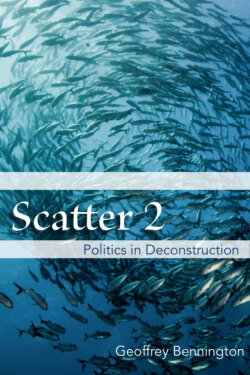Scatter 2

Реклама. ООО «ЛитРес», ИНН: 7719571260.
Оглавление
Geoffrey Bennington. Scatter 2
CONTENTS
PREFACE
ABBREVIATIONS OF WORKS BY JACQUES DERRIDA
INTRODUCTION. Politics in Deconstruction
CHAPTER 1. Bios Theōrētikos, Bios Politikos
CHAPTER 2. Polykoiranie I (Derrida, Homer, Aristotle, Xenophanes)
CHAPTER 3. Polykoiranie II (Philo Judaeus, Early Christian Apologists, Pseudo-Dionysius)
CHAPTER 4. Polykoiranie III (John of Salisbury, Aquinas, Dante, Marsilius of Padua)
CHAPTER 5. Polykoiranie IV (Bodin, La Boétie)
CHAPTER 6. To Poikilon (Plato, Alfarabi, Aristotle)
CHAPTER 7. Democracy (Arendt, Aristotle)
CHAPTER 8. Protodemocracy and the Fall of Sovereignty (Hobbes, Aristotle)
CHAPTER 9. Nature, Sovereignty, Government (Spinoza, Rousseau)
CHAPTER 10. Stasiology (Rothaug, Peterson, Schmitt, Gregory of Nazianzus)
POSTSCRIPT
INDEX
Отрывок из книги
SCATTER 2
In the event, after some unsatisfactory experiments, and some only partially successful forays into electronic publishing,4 that version of the project has not been (publicly) realized, largely for technical reasons, and both volumes of Scatter are in the end more or less recognizable, and relatively self-standing, academic books. The intelligibility of Scatter 2 does not require the reader to be familiar with Scatter 1, although I regularly appeal here to its guiding notion of “the politics of politics,” by which I claim that the aspects of politics usually (I believe moralistically) deprecated as sophistry and rhetoric are, like it or not, irreducible, and that there is no politics unaffected by the politics of politics.5 From the hierarchy of levels of the original design for the Scatter project, however, I can rapidly state the “top-level” claims being made here, and although the lower-level organization is no longer conceived in quite the same way (without for all that being entirely linear: there is no really compelling need to read the “chapters” in the order in which they are presented here), the interested reader might nonetheless be able to reconstruct it to some extent. The argument of the book might be presented in a half-dozen propositions:
.....
“Tell me.”
“There is no end to suffering, Glaucon, for our cities, and none, I suspect, for the human race, unless either philosophers become kings in our cities, or the people who are now called kings and rulers become real, true philosophers—unless there is this amalgamation of political power and philosophy, with all those people whose inclination is to pursue one or other exclusively being forcibly prevented from doing so. Otherwise there is not the remotest chance of the political arrangements we have described coming about—to the extent that they can—or seeing the light of day. This is the claim which I was so hesitant about putting forward, because I could see what an extremely startling claim it would be. It is hard for people to see that this is the only possible route to happiness, whether in private life or public life.”
.....